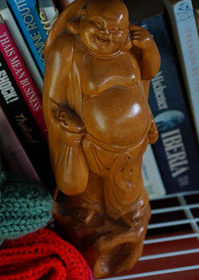A Look East

I remember as a young child seeing on television this smiling, benevolent-looking man covered in flowing orange cloth. He was a visitor from a place far away; he was the Dalai Lama from Tibet. [Of all the countless images and thoughts that pass through a mind in a lifetime, why do a few stay stuck, and others simply whiz by like glimpses through a bullet train’s window?]
Then, as a young adult, I came to know of the Dalai Lama as a man that is the spiritual leader of the world’s Buddhists. However, his visage of geniality and message of peace was never enough of an impetus for me to discard all my worldly possessions and trek to Tibet to “find religion,” myself, or the meaning of life; that was left to The Beattles.
As the responsible time of life continued, I had the good fortune to have visited Thailand on business, both in the early ‘70s and then again in the mid-1990s. Each time I saw men – Buddhist monks – dressed only in that same orange fabric. And when I write “only” I mean that literally: During the trip there in 1996, for example, I saw that the monks walking on the steamy asphalt streets of Bangkok, being given alms, had no shoes. Ouch!
It would have been easy as a Westerner to dismiss the lack of a full complement of clothing as something peculiar to a religious cult. But all religions have their unique practices. In this case the thought took hold that having nothing but the clothes on your back was the ultimate freedom.
Sprinkle in a few more overseas trips to China, where I bought incense outside the oldest Buddhist Temple in the country, and one to Tokyo where a colleague took me to a large temple to observe and hear prayers, and my exposure to Buddhism expanded, but still not beyond the level of a tourist.
As the cycle of life kept turning I needed to try and make sense of the earlier decades: Why people did what they did both to themselves and to others? While acknowledging and understanding a great deal of the psychology of human behavior, for many people religion figures prominently in how they conduct themselves every day. Therefore, you need to know and consider both to have a fair chance of figuring them out.
So, because I want to hedge my bets before adopting the spiritual part of that equation- we do have until our dying breath, don’t we? – I continue reading the written word of the world’s organized religions. Currently at the top of the pile of books on the floor alongside my bed is The Teaching of Buddha. [It alternates with my copy of The Quran that I brought back from Saudi Arabia and a more recent acquisition: the 1611 King James version of The Bible.]
Whichever of the books of God that I read my primary interest is to look for what can inspire people – including me – to be both decent human beings and to use all their God-given talents to the fullest.
What particularly impresses me about Buddhism is the absence of any history of violence and the call to death and destruction in its name. Instead it is replete with sentiments that go to your state of mind, and what you can do with it to reach Enlightenment.
The religion was founded in India by the Buddha Gautama, “..who came to be known by later Buddhist followers as Shakyamuni or the ‘Sage of the Shakya clan….’” He is thought to have attained Enlightenment in the middle of the 5th century B.C.
Here are a few passages from The Teaching that are representative of a recurrent theme: greed and passion are the cause of the world’s ills:
- “If you find your mind tempted and so entangled in greed, you must suppress and control the temptation; be the master of your own mind.”
- “You must break the bonds of worldly passion and drive them away as you would a viper. You must positively protect your mind.”
Getting a 21st century potential believer to throttle desire and passion can be tough. For example, I have so far been unable to comprehend how you realize talents from God that each of us possesses without the energy of passion; and how many of us would accept a life where greed is defined as any possession above the barest of necessities?
Turning to a practical consideration, if we eliminated the things which are tied to greed and our materialistic society, how would we all make a living?
But I also found many more less-conflicted sentiments that if practiced would make the world in 2016 a much better place:
- “Buddha, aiming at his ideal, trained himself to remain free from all deception, he wished that all people might know the tranquility of mind that would follow in speaking the truth.”
- “He trained himself to avoid double-talk, he wished that all people might know the joy of fellowship.”
That brings the current stage of my investigation into Buddhism to a close.
But if I need added inspiration to continue reading and thinking about the ancient teachings, I have only to look each morning at the top of a book case where resides a Buddha given to me by a good friend in China. How can you not be receptive to a religion that has such a warm and inviting figure to represent it?
[Note: All quoted passages come from my copy of The Teaching of Buddha, Toppan Printing Co. (S) Pte. Ltd., Japan; made possible by BUKKYO DENDO KYOKAI (Buddhist Promoting Foundation.) I thank them for the book.]